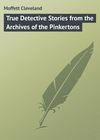Читать книгу: «True Detective Stories from the Archives of the Pinkertons», страница 4
Denton, in the meantime, had left Salt Lake and gone to Omaha, there to make his home. The boy Burke, argued the detective, had naturally followed his friend to that place. An accurate description of Burke was got from the records of the Utah penitentiary, and some idea of him and his friends was derived from the officials of the prison. But where to find him in the whole great West was a question.
Inquiries at Salt Lake developed the further fact that Burke had had one intimate friend there, a man named Marshall P. Hooker. Hooker had now, however, left Salt Lake and removed to Denver. For a man of his class, Hooker was unusually talkative, and was known by "crooks" throughout the country as "Windy" Hooker. Plans were made for keeping a watch on him and on Jack Denton, in the hope, by "shadowing" the movements of these two, of ultimately locating Burke.
Through the free talk of Hooker, reported back to the detective, it was soon learned that Burke was known by the alias of "Kid" McCoy, and that he had recently been operating on the Pacific coast in "holding up" faro-banks, and had also been concerned in two large robberies, one at Lincoln, Nebraska, and the other at Sacramento, California. His whereabouts at that time, however, were unknown.
Much time had now elapsed since the robbery, and the sensation caused by it had died out. Jack Denton and his friends seldom spoke of it, and Hooker never spoke of it unless the subject was introduced to him. Both men were extremely shy of strangers, and it was almost impossible for a detective to draw them out, as anybody who introduced the subject of the robbery was at once looked upon with suspicion. For the purpose of creating further talk upon the subject, Mr. Pinkerton caused to be inserted in the Omaha papers an advertisement as follows:
"Five hundred dollars will be paid for any information leading up to the identification of the party who robbed William G. Pollock on the Sioux City and Pacific train, November 4, 1892.
"William A. Pinkerton,
"Paxton House, Omaha, Nebraska."
This at once attracted the attention of the local newspaper-men, and when Mr. Pinkerton arrived in Omaha he was interviewed by all the papers in the city in regard to the robbery. Thus interest in the robbery was at once renewed. Denton and the other persons under suspicion commenced talking of the matter again, none more freely than Hooker.
The latter was then in Denver. Mr. Pinkerton instructed Mr. James McParland, Denver superintendent of the Pinkerton Agency, to send for him, and say to him that he had understood that he (Hooker) could throw some light on the robbery, and that a large sum of money would be paid him for the information he gave. Mr. Pinkerton explained to Mr. McParland that Hooker would lie to him and endeavor to get the money by giving him false information, but to listen patiently to what he had to say and lead him on as far as possible without giving him any money. This done, Mr. Pinkerton further predicted that Hooker would go back to his cronies and boast of the way he was fooling Pinkerton and how much money he expected to get; and that eventually, through his boastings, he would prove the means of locating Burke, alias McCoy.
And so, precisely, it fell out. Some of Hooker's companions were Pinkerton detectives, although Hooker did not know them as such, and they in time reported back that Burke was really the Pollock robber; that after committing the robbery he had gone back to Omaha, and from there had gone to Denver. From Denver he went to Salt Lake, and visited a prisoner in the Salt Lake penitentiary with whom he was intimate, gave this prisoner some money, and went from Salt Lake west to the Pacific coast.
Mr. Pinkerton next instructed that the record be examined for daring "hold-ups" that might have occurred in the country lately traversed by Burke. It was then found that a faro-bank at Colorado City, a small place between Manitou Springs and Colorado Springs, had been entered late at night by a masked robber, who compelled the dealer and other persons to hold up their hands, took the money in the drawer, and escaped; that later on a similar robbery had been perpetrated at San Bernardino, California; that later still the pool-rooms of James Malone, a noted gambler at Tacoma, Washington, had been treated in the same manner; and, finally, that a light or pane of glass in a jewelry store at Sacramento had been broken in and a tray of diamonds snatched from the window by a daring thief. And all of these deeds, Mr. Pinkerton learned ultimately through Hooker's talk, had been done by Burke.
The watch on Denton at Omaha developed little, if anything, except that a close companionship existed between him and the Omaha pawnbroker.
During the summer of 1893, learning that an intimate friend of Burke's, a burglar who had been in prison with him in the Utah penitentiary, was confined in jail at Georgetown, Texas, Mr. Pinkerton decided to go and interview this man, and see if he could get any trace, through him, of the robber. In the meantime he instructed the detectives at Omaha and Denver to keep a particularly close watch on Jack Denton and Hooker.
On Mr. Pinkerton's arrival at Austin, Texas, he found awaiting him despatches from Superintendent McParland of the Denver agency, stating that through Hooker's talk they had learned that "Kid" McCoy, or Burke, had been arrested at Eagle, Colorado, with a kit of burglar tools in his possession, and was then in jail at Leadville, Colorado.
Mr. Pinkerton at once telegraphed to have conductor Ashmore and Mr. Shaw, the well-digger, go to Leadville and see if they could identify the prisoner. Word was also sent to New York for Mr. Pollock to do the same. He also instructed Superintendent McParland at Denver to send his assistant, J. C. Fraser, to watch the case, so that if McCoy gave bail, or attempted to escape from the Leadville jail, they could be ready with a warrant for his arrest on account of the Pollock robbery.
Having wired these instructions, Mr. Pinkerton proceeded on his journey to Georgetown, Texas, where he called on McCoy's former prison associate in the Utah penitentiary, but was unable to get him to tell anything about McCoy, though he volunteered, if Mr. Pinkerton would furnish him a bond and get him out of his Texas scrape, to go to Omaha and compel the "fence" who had received the diamonds to turn back the property. But the rule of the Jewelers' Protective Union was to get the thief first and the property afterward; so no treaty was made with the Texas prisoner.
Mr. Pinkerton now went to Kansas City, and found awaiting him there despatches from Superintendent McParland of the Denver agency, stating that conductor Ashmore and Messrs. Shaw and Pollock had positively identified the prisoner James Burke, alias "Kid" McCoy, as the man who assaulted Mr. Pollock and robbed him of his diamonds.
Burke winced perceptibly when he saw conductor Ashmore and Mr. Shaw, and went fairly wild when confronted by Mr. Pollock. Requisition papers were obtained from the governor of the State of Iowa on the governor of Colorado, and the Colorado offense being a minor one, Burke was turned over to Assistant Superintendent Fraser and another detective, to be taken to Logan, Harrison County, Iowa. Before leaving Leadville, Mr. Fraser was confidentially warned by the sheriff of the county that he could not be too careful of his prisoner; for that Burke, through a friend of the sheriff, had made a proposition to the latter to pay him a thousand dollars if he would secretly furnish him with a revolver when he left the jail, his design being, with this revolver, to either "hold up" or kill the two detectives who had him in custody and make his escape from the train.
On trial at Logan, Iowa, the man was easily convicted, and was sentenced to imprisonment for a term of seventeen years.
The Rock Island Express
I
The through express on the Rock Island road left Chicago at 10:45 P. M., on March 12, 1886, with twenty-two thousand dollars in fifty- and one-hundred-dollar bills in the keeping of Kellogg Nichols, an old-time messenger of the United States Express Company. This sum had been sent by a Chicago bank to be delivered at the principal bank in Davenport, Iowa. In addition to the usual passenger-coaches, the train drew two express-cars: the first, for express only, just behind the engine; and, following this, one for express and baggage. These cars had end doors, which offer the best opportunity to train robbers. Messenger Nichols was in the first car, and was duly at his work when the train stopped at Joliet, a town about forty miles west of Chicago. But at the next stop, which was made at Morris, Harry Schwartz, a brakeman, came running from Nichols's car, crying, "The messenger is dead."
The messenger's lifeless body was found lying on the floor of the car. The head had been crushed by some heavy weapon, and there was a pistol-wound in the right shoulder. Apparently he had been overcome only after a hard fight. His face was set with fierce determination. His fists were clenched, and the hands and fingers cut and scratched in a curious way, while under the nails were found what proved to be bits of human flesh. The pistol-wound was from a weapon of 32 caliber; but it was not the cause of the man's death. This, unmistakably, was the blow, or blows, on the head, probably after the shot was fired. All who knew messenger Nichols were surprised at the desperate resistance he seemed to have made, for he was a small, light man, not more than five feet five in height, nor weighing over one hundred and thirty pounds, and of no great credit among his fellows for pluck and courage.
The express-car was immediately detached from the train, and left at Morris, guarded by all the train-crew except Schwartz, who was sent on with the train to Davenport. After the first cursory inspection no one was allowed to enter the car where Nichols lay; and nothing was known precisely as to the extent of the robbery. The safe-door had been found open and the floor of the car littered with the contents of the safe.
An urgent telegram was at once sent to Chicago, and a force of detectives arrived at Morris on a special train a few hours later. Search-parties were at once sent out in all directions along the country roads, and up and down the tracks. Hundreds of people joined in the search, for the news of the murder spread rapidly through the whole region, and not a square yard of territory for miles between Morris and Minooka station was left unexplored. It happened that the ground was covered with snow, but the keenest scrutiny failed to reveal any significant footprints, and the search-parties returned after many hours, having made only a single discovery. This was a mask found in a cattle-guard near Minooka – a mask made of black cloth, with white strings fastened at either side, one of which had been torn out of the cloth as if in a struggle.
Meantime Mr. Pinkerton himself entered the car and made a careful investigation. His first discovery was a heavy poker, bearing stains of blood and bits of matted hair. It was hanging in its usual place, behind the stove. The significance of this last fact was great, in Mr. Pinkerton's opinion; from it he concluded that the crime had been committed by a railroad man, his reasoning being that the poker could have been restored to its usual place after such a use only mechanically and from force of habit and that an assailant who was not a railroad man would have left it on the floor or thrown it away.
Coming to the safe, Mr. Pinkerton found that the twenty-two thousand dollars were missing, and that other papers had been hastily searched over, but left behind as valueless.
Among these was a bundle of canceled drafts that had been roughly torn open and then thrown aside. Mr. Pinkerton scarcely noticed at the moment, but had occasion to remember subsequently, that a small piece of one of these drafts was missing, as if a corner had been torn off.
All the train-hands were immediately questioned, but none of their stories was in any way significant, except that of Newton Watt, the man in charge of the second car. He said that while busy counting over his way-bills and receipts he had been startled by the crash of broken glass in the ventilator overhead, and that at the same moment a heavily built man, wearing a black mask, had entered the car and said, "If you move, the man up there will bore you." Looking up, Watt said further, he saw a hand thrust through the broken glass and holding a revolver. Thus intimidated, he made no attempt to give an alarm, and the masked man presently left him under guard of the pistol overhead, which covered him until shortly before the train reached Morris, when it was withdrawn. He was able to locate the place where the crime must have been committed, as he remembered that the engine was whistling for Minooka when the stranger entered the car. This left about thirty minutes for the murder, robbery, and escape.
Returning to Chicago, Mr. Pinkerton investigated the character of the man Watt, and found that he had a clean record, was regarded as a trusty and efficient man, and had three brothers who had been railroad men for years and had always given perfect satisfaction. Watt's good reputation and straightforward manner were strong points in his favor, and yet there was something questionable in his story of the mysterious hand. For one thing, no footprints were found in the snow on the top of the car.
Brakeman Schwartz, the only man on the train who had not yet been questioned, "deadheaded" his way, in railway parlance, back from Davenport the following night on conductor Danforth's train, and reported to Mr. Pinkerton the next morning. He was a tall, fine-looking young fellow, about twenty-seven, with thin lips and a face that showed determination. He was rather dapper in dress, and kept on his gloves during the conversation. Mr. Pinkerton received him pleasantly, and, after they had been smoking and chatting for an hour or so, he suggested to Schwartz that he would be more comfortable with his gloves off. Schwartz accordingly removed them, and revealed red marks on the backs of his hands, such as might have been made by finger-nails digging into them.
"How did you hurt your hands, Schwartz?" asked Mr. Pinkerton.
"Oh, I did that handling baggage night before last," explained Schwartz; and then he related incidentally that as he was on his way back to Chicago, the conductor of the train, conductor Danforth, had discovered a valise left by somebody in one of the toilet-rooms. Later in the day Mr. Pinkerton summoned the conductor, who said that the valise was an old one, of no value; and, having no contents, he had thrown it out on an ash-pile. The only thing he had found in the valise was a piece of paper that attracted his attention because it was marked with red lines.
Examining this piece of paper carefully, Mr. Pinkerton saw that it had been torn from a money-draft, and at once thought of the package in the express messenger's safe. Now it is a remarkable fact that no human power can tear two pieces of paper in exactly the same way; the ragged fibers will only fit perfectly when the two original parts are brought together. There remained no doubt, when this test was made in the present case, that the piece of paper found on conductor Danforth's east-bound train had been torn from the draft in the express-car robbed the night before on the west-bound train. The edges fitted, the red lines corresponded, and unquestionably some one had carried that piece of paper from the one train to the other. In other words, some one connected with the crime of the previous night had ridden back to Chicago twenty-four hours later with conductor Danforth.
Mr. Pinkerton at once ordered a search made for the missing valise, and also an inquiry regarding the passengers who had ridden on conductor Danforth's train between Davenport and Chicago on the night following the murder. The valise was found on the ash-heap where the conductor had thrown it, and in the course of the next few days the detectives had located or accounted for all passengers on conductor Danforth's train, with the exception of one man who had ridden on a free pass. The conductor could only recall this man's features vaguely; and, while some of the passengers remembered him well enough, there was no clue to his name or identity. As it appeared that no other of the passengers could have been connected with the crime, efforts were redoubled to discover the holder of this pass.
II
So great was the public interest in the crime and the mystery surrounding it that three separate, well-organized investigations of it were undertaken. The Rock Island Railroad officials, with their detectives, conducted one; a Chicago newspaper, the "Daily News," with its detectives, another; and the Pinkertons, in the interest of the United States Express Company, a third.
Mr. Pinkerton, as we have seen, concluded that the crime had been committed by railway men. The railway officials were naturally disinclined to believe ill of their employees, and an incident occurred about this time which turned the investigation in an entirely new direction and made them the more disposed to discredit Mr. Pinkerton's theory. This was the receipt of a letter from a convict in the Michigan City penitentiary, named Plunkett, who wrote the Rock Island Railroad officials, saying that he could furnish them with important information.
Mr. St. John, the general manager of the road, went in person to the penitentiary to take Plunkett's statement, which was in effect that he knew the men who had committed the robbery and killed Nichols, and was willing to sell this information in exchange for a full pardon, which the railroad people could secure by using their influence. This they promised to do if his story proved true, and Plunkett then told them of a plot that had been worked out a year or so before, when he had been "grafting" with a "mob" of pickpockets at county fairs. There were with him at that time "Butch" McCoy, James Connors (known as "Yellowhammer"), and a man named "Jeff," whose surname he did not know. These three men, Plunkett said, had planned an express robbery on the Rock Island road, to be executed in precisely the same way, and at precisely the same point on the road, as in the case in question.
The story was plausible, and won Mr. St. John's belief. It won the belief, also, of Mr. Melville E. Stone of the "Daily News"; and forthwith the railway detectives, working with the newspaper detectives, were instructed to go ahead on new lines, regardless of trouble or expense. Their first endeavor was to capture "Butch" McCoy, the leader of the gang. "Butch" was a pickpocket, burglar, and all-around thief, whose operations kept him traveling all over the United States.
The police in various cities having been communicated with to no purpose, Mr. Stone finally decided to do a thing the like of which no newspaper proprietor, perhaps, ever undertook before – that is, start on a personal search for McCoy and his associates. With Frank Murray, one of the best detectives in Chicago, and other detectives, he went to Galesburg, where the gang was said to have a sort of headquarters. The party found there none of the men they were after, but they learned that "Thatch" Grady, a notorious criminal with whom "Butch" McCoy was known to be in relations, was in Omaha. So they hurried to Omaha, but only to find that Grady had gone to St. Louis. Then to St. Louis went Mr. Stone and his detectives, hot on the scent, and spent several days in that city searching high and low.
The method of locating a criminal in a great city is as interesting as it is little understood. The first step is to secure from the local police information as to the favorite haunts of criminals of the class under pursuit, paying special regard in the preliminary inquiries to the possibility of love-affairs; for thieves, even more than honest men, are swayed in their lives by the tender passion, and are often brought to justice through the agency of women. With so much of such information in their possession as they could gather, Mr. Stone and his detectives spent their time in likely resorts, picking up acquaintance with frequenters, and, whenever possible, turning the talk adroitly upon the man they were looking for. It is a mistake to suppose that in work like this detectives disguise themselves. False beards and mustaches, goggles and lightning changes of clothing, are never heard of except in the pages of badly informed story-writers. In his experience of over twenty-five years Mr. Murray never wore such a disguise, nor knew of any reputable detective who did. In this expedition the detectives simply assumed the characters and general style of the persons they were thrown with, passing for men of sporting tastes from the East; and, having satisfied the people they met that they meant no harm, they had no difficulty in obtaining such news of McCoy and the others as there was. Unfortunately, this was not much.
After going from one city to another on various clues, hearing of one member of the gang here and another there, and in each instance losing their man, the detectives finally brought up in New Orleans. They had spent five or six weeks of time and a large amount of money, only to find themselves absolutely without a clue as to the whereabouts of the men they were pursuing. They were much discouraged when a telegram from Mr. Pinkerton told them that "Butch" McCoy was back in Galesburg, where they had first sought him. Proceeding thither with all despatch, they traced McCoy into a saloon, and there three of them, – John Smith, representing the Rock Island Railroad; John McGinn, for the Pinkerton Agency; and Frank Murray, working for Mr. Stone, – with drawn revolvers, captured him, in spite of a desperate dash he made to escape.
McCoy's capture was the occasion of much felicitation among the people interested in the matter. Mr. St. John and Mr. Stone were confident that now the whole mystery of the express robbery could be solved and the murderer convicted. But McCoy showed on trial that he had left New Orleans to come North only the night before the murder and had spent the whole of that night on the Illinois Central Railroad. It also appeared that McCoy's associate, Connors, was in jail at the time of the robbery, and that the man "Jeff" was dead. Thus the whole Plunkett story was exploded.
III
Some time before this the man who had ridden on the free pass, and given the detectives so much trouble, had been accidentally found by Jack Mullins, a brakeman on conductor Danforth's train. He proved to be an advertising solicitor, employed by no other than Mr. Melville E. Stone, who would have given a thousand dollars to know what his agent knew; for the advertising man had seen the conductor bring out the valise containing the all-important fragment of the draft. But he had not realized the value of the news in his possession, and Mr. Pinkerton took good care to keep him from that knowledge. One hint of the truth to the "Daily News" people, and the whole story would have been blazoned forth in its columns, and the murderer would have taken warning. Not until he had seen the man safely on a train out from Chicago did Mr. Pinkerton breathe easily; and it was not until months later that Mr. Stone learned how near he came to getting a splendid "scoop" on the whole city and country.
The identification of the pass-holder removed the last possibility that the valise had been taken into the train by any of conductor Danforth's passengers. And yet the valise was there! How came it there? In the course of their examination two of the passengers had testified to having seen Schwartz enter the toilet-room during the run. Brakeman Jack Mullins stated that he had been in the same room twice that night, that the second time he had noticed the valise, but that it was not there when he went in first. Other witnesses in the car were positive that the person who entered the room last before the time when Mullins saw the valise was Schwartz. Thus the chain of proof was tightening, and Mr. Pinkerton sent for Schwartz.
After talking with the brakeman in a semi-confidential way for some time, the detective began to question him about Watt, his fellow-trainman. Schwartz said he was a good fellow, and, in general, spoke highly of him. Mr. Pinkerton seemed to hesitate a little, and then said:
"Can I trust you, Schwartz?"
"Yes, sir."
"Well, the fact is, I am a little suspicious of Watt. You see, his story about that hand overhead does not exactly hang together. I don't want to do him any wrong, but he must be looked after. Now, my idea is to have you go about with him as much as you can, see if he meets any strangers or spends much money, and let me know whatever happens. Will you do it?"
Schwartz readily consented, on the assurance that the railroad people would give him leave of absence. The next day he reported that Watt had met a man who wore a slouch-hat, had unkempt red hair, and in general looked like a border ruffian. He had overheard the two talking together in a saloon on Cottage Grove Avenue, where the stranger had discussed the murder of Nichols in great detail, showing a remarkable familiarity with the whole affair. Schwartz had a sort of Jesse James theory (which he seemed anxious to have accepted) that the crime had been committed by a gang of Western desperados and that this fellow was connected with them.
Mr. Pinkerton listened with interest to all this, but was less edified than Schwartz imagined, since two of his most trusted "shadows," who had been following Schwartz, had given him reports of the latter's movements, making it plain that the red-haired desperado was a myth, and that no such meeting as Schwartz described had taken place. Nevertheless, professing to be well pleased with Schwartz's efforts, Mr. Pinkerton sent him out to track the fabulous desperado. Schwartz continued to render false reports. Finally, without a word to arouse his suspicion, he was allowed to resume his work on the railroad.
The "shadows" put upon Schwartz after this reported a suspicious intimacy between him and Watt, and a detective of great tact, Frank Jones, was detailed to get into their confidence, if possible. He was given a "run" as brakeman between Des Moines and Davenport, and it was arranged that he should come in from the west and lay over at Davenport on the same days when Schwartz and Watt laid over there, coming in from the east. Jones played his part cleverly, and was soon on intimate terms with Schwartz and Watt, taking his meals at their boarding-house and sleeping in a room adjoining theirs. They finally came to like him so well that they suggested his trying to get a transfer to their "run," between Davenport and Chicago. This was successfully arranged, and then the three men were together constantly, Jones even going to board at Schwartz's house in Chicago. About this time Schwartz began to talk of giving up railroad work and going to live in Kansas or the far West. It was arranged that Jones should join him and Mrs. Schwartz on a Western trip. Meantime Schwartz applied to the company for leave of absence, on the plea that he wished to arrange some family matters in Philadelphia.
Mr. Pinkerton, being informed by Jones of Schwartz's application, used his influence to have it granted. When the young man started East he did not travel alone. His every movement was watched and reported, nor was he left unguarded for a moment, day or night, during an absence of several weeks, in New York, Philadelphia, and other Eastern cities.
To one unfamiliar with the resources and organization of a great detective system it is incomprehensible how continuous "shadowing" day after day and week after week, through thousands of miles of journeying, can be accomplished. The matter is made none the simpler when you know that there must be a change of "shadows" every day. However adroit the detective, his continued presence in a locality would soon arouse suspicion. The daily change of "shadows" is easy when the man under watch remains in one place; for then it is only necessary to send a new "shadow" from the central office early each morning to replace the one who "put the man to bed" the night before. But it is very different when the subject is constantly traveling about on boats or railways, and perhaps sleeping in a different town each night. Without the network of agencies, including large and small bureaus, that the Pinkertons have gradually established all over the United States, the "shadowing" of a man in rapid flight would be impossible. As it is, nothing is easier. Schwartz, for instance, spent several days in Buffalo, where his actions were reported hour by hour until he bought his ticket for Philadelphia. As he took the train a fresh "shadow" took it too, securing a section in the same sleeping-car with him, and taking his meals at the same time Schwartz took his, either in the dining-car or at stations. No sooner had the train left the station than the Pinkerton representative in Buffalo reported by cipher-despatch to the bureau in Philadelphia, whither Schwartz was going. The exact form of the despatch, which well illustrates a system in constant use in the Pinkerton bureaus, was as follows:
"R. J. Linden,
"441 Chestnut Street,
"Philadelphia, Pa.
"Anxious shoes sucker Brown marbles man other dropping eight arrives put grand fifty marbles articles along or derby coat ship very tan seer wearing these have and is ribbon ink dust central Tuesday for dust to rice hat and paper vest yellow ink get must jewelry morning depot on.
"D. Robertson."
In despatches of this sort important information regarding criminals is constantly flashing over the wires, with no danger of any "leak."
Покупайте книги и получайте бонусы в Литрес, Читай-городе и Буквоеде.
Участвовать в бонусной программе




















